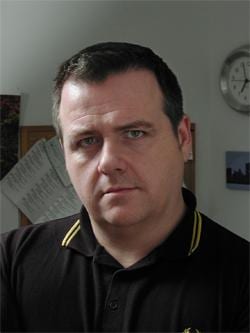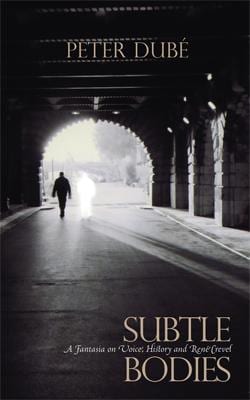With his latest novel, Montreal author Peter Dubé reaches into the rich life of poet René Crevel and explores his tortured relationship to the surrealist movement. Set in the dirty ’30s, Subtle Bodies: A Fantasia on Voice, History and René Crevel, conjures up a speculative biography of Crevel.
In the author’s keen imagination, Crevel holds fraudulent séances to gain acceptance with the elite surrealist set. But Crevel’s connection to other dimensions and realities may not be so fraudulent after all, as he begins to experience powerful trances and visions. What are these mysterious voices telling him? Crevel soon finds that the inspired voices in his head are less a gift than a curse. The result is a spooky, sexy book, full of inspired and unexpected turns — another triumph for the decidedly talented Dubé. Xtra talked with Dubé in Montreal, where he spoke about discovering surrealism while coming out, being an outsider and his major influences.
Xtra: When did you first learn of the work of Crevel?
Peter Dubé: My awareness of — and relationship to — Crevel’s work grew out of my connection to the surrealist movement more generally, which in a strange (or is it?) twist of biography is inextricably tied up in my mind with my coming-out process.
The fact is I came out early, back in my adolescence and — being a bookish kid — stumbled on surrealism nearly simultaneously. Since I lived in a big city — Montreal — and because of that moment in time, I was able to join a queer youth group run by guys active in the Gay Lib movement when it was still fairly radical, so my exposure to two such vehement “cultures of desire” kind of knocked me on my ass. My thinking about some of these links forms the substance of my introductory essay to an anthology I edited called Madder Love. Thereafter, I came upon Crevel’s work while deepening my reading, and the realization that there was a fairly “out” homo in the original surrealist group clinched it for me. I read most of what I could find by/about him.
Xtra: Why did you feel such a strong connection to his story?
PD: I think it was the confluence of desire and politics and art coming together in a movement and a figure. When I was that bookish adolescent, I was deeply concerned with making intellectual connections between my various obsessions, and the idea that Crevel was a sort of bridge between the radical gay stuff and surrealism was important to me. And, of course, his suicide and the ambiguity around it left so many open questions. I’ve since discovered there are other such bridges over what is, admittedly, a sometimes-turbulent body of water, but Crevel remains particularly powerful.
Xtra: One would have thought that the surrealists would have been open to subversive sexuality, including homosexuality. Yet it wasn’t that simple. It was a bit of a tortured relationship, wasn’t it?
PD: Yes, sadly, it was a distinctly tortured relationship. But it’s very, very important, I think, to draw a distinction between surrealism as a movement and the personality of André Breton, who was, of course, its principal theorist and one of its major poets. Although Breton is someone of central importance to me intellectually and artistically, one of a handful of core figures really, my relationship to him is an almost classic example of love-hate. It’s mind-boggling that someone who was so committed to a transformative social project and the liberation of love and desire could be so backwardly homophobic… and let’s not neglect the sexism, either! That said, surrealism was, and is, a big, complex and tumultuous movement that hosted a whole bunch of debate and different opinions — and it included participants all over the sexual map. One need only read the text of some of their meetings in, for example, Investigating Sex: Surrealist Discussions 1928-1932 to get a sense of this. One wonders about what might have been happening that didn’t make it into the documentation…
Xtra: I really like what the séance sequences say about that very gay need to belong, even at the price of any and all honesty. Are we gay men all destined to remain in high school mindset for eternity?
PD: Thanks. There’s no question that there is something of that teenaged homo eagerness to please you identify animating those passages… but there are also strong traces of the hunger to hold forth and impress that animates, I think, a lot of young people at the early stages of their careers, particularly in the arts. Of course, those are probably not unrelated feelings, and I think they’re common to outsiders, or more specifically outsiders who recognize and take advantage of the different perspective a position on the margins offers. And I suspect people are likely to feel and act that way as long as our culture continues to create centres and margins.
Xtra: What would you say your main influences are?
PD: Well, limiting it to writers and aside from those obvious from our discussion so far, like the surrealists and a number of liberationist gay authors, the key figures for me are those working at uniting social investigation and an interest in the nature of “experience” with a kind of intensity of language. Folks like Jean Genet and William Burroughs for example, or the British writer Angela Carter. And, of course, I have a number of friends who write and with whom I talk about writing all the time. Those exchanges have an impact on what ends up on the page as well.
Xtra: Your work is rich and literate, but the book feels very cinematic too. Any talk of a film adaptation?
PD: Once again, thanks! However, much to my chagrin, no such talk yet. But if anyone is interested, by all means be in touch!
Subtle Bodies (Lethe Press, $13) has its Montreal launch on Monday, Oct 18 at 7pm at the Casa del Popolo (4873 St Laurent). Dubé will also appear in Ottawa at Xtra‘s Transgress on Friday, Oct 22 at 8:30pm at the Mayfair Theatre (1074 Bank St).


 Why you can trust Xtra
Why you can trust Xtra


